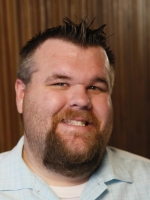Lawyers know how to talk, but what if they were trained what to say?
Scientists know exactly how people think, but what if they shared that information with people who could make the most use of it, and do it persuasively?
That was the thinking behind a recent science and law seminar at the Phoenix Convention Center, one of a series of silo-busting interdisciplinary workshops hosted by Arizona State University's Sandra Day O'Connor College of Law that keeps attorneys sharp while offering the public a glimpse how law and the justice system intersects.
“ASU offers these programs to attorneys because we want to appeal to our alumni while staying connected to the lawyering community,” said Christopher G. Marohn, director of ASU Law’s Continuing Legal Education program. He added that Arizona attorneys are required to have 15 hours of continuing education credit every year by June 30, the end of their fiscal year.

Christopher G. Marohn
Marohn said although their programs are designed for attorneys, they are open to the public to “inform society how laws are made and to give them a better understanding of how lawyers operate in society.”
It’s a philosophy that Phoenix attorney Wendy Laskin appreciates. Laskin, a sole practitioner who specializes in mental health, probate and elder law, has attended several of these programs.
“As an attorney I can go and get credit, but it also stretches my mind as a community member,” said Laskin, who attended sessions on the Fourth Amendment, firearms and immigration, providing her “with another set of knowledge.”
This approach fits in with ASU Law’s dedication to inclusiveness and the university’s interdisciplinary approach to problem solving that has led to collaborations between business and computer science, sustainability and poetry, and science and art.
The Continuing Legal Education Program hosts approximately 40 seminars, conferences, workshops, and panel discussions a year, tackling issues such as the corporatization of the prison system, design and construction, negotiation strategies, data management and emerging technologies.
Marohn, a former public defender from California, selects the curriculum, which is a mix of traditional and topical subjects.
“I pick a lot of subjects based on what’s trending in the law,” Marohn said. “Sometimes we fly off the handle and see what’s fun to do.”
That was the thinking behind “The Corporatization of Criminal Justice,” which evolved from a casual conversation Marohn had with a friend over coffee.
The April 14 conference featured civil rights leader Benjamin Jealous and tackled issues arising from the for-profit prison system, claiming it has influenced the length and severity of sentences, disproportionately harming communities of color and contributing to social inequity and oppression.
Jane Dacey, who works for the Arizona-based non-profit called Abolish Private Prisons, helped coordinate the conference with Marohn after another law school fell through. She said the free conference was attended by approximately 100 attorneys, advocates and community members, and streamed to hundreds of others online.
“The conference went over well because it featured presenters with a different perspective on mass incarceration,” Dacey said. After the conference, Dacey said she often checks with ASU’s calendar listing because “the university has so many interesting things going on.”
Two weeks later the Continuing Legal Education program hosted, “The Science of Decision Making: Persuading Judges and Jurors,” featuring national experts and Nobel Prize-winning research on human decision-making in the courtroom when presented sophisticated scientific information.
“Courtroom persuasion is all about trying to anticipate how jurors and judges will think, feel and interpret the arguments they are presenting,” said Jessica Salerno, an assistant psychology professor in the Social and Behavioral Sciences division of the New College of Interdisciplinary Arts and Sciences, and a researcher with the newly established Program on Law and Behavioral Science.
Her April 28 seminar presentation “Hot and Cold: How Decisions are Affected by Emotions and Gore,” demonstrated the emotional impact that crime-scene photos, videos and documents can have on juries, often leading to anger and a rush to judgment.
Jessica Salerno
“When we have negative emotions aroused, that might lead jurors to prosecution evidence and ignore the defense,” Salerno said. “Anger and disgust can lead people to want to more punishment, longer sentences and larger damages.” She said defense attorneys could reduce the emotions of a jury by forcing verbal testimony over video, presenting photographs in black and white rather than color and showing them at the end of the trial rather than at the beginning.
For criminal law attorney Robert J. Weber, a member of ASU Law’s inaugural class, although he enjoys the “exciting and thought-provoking curriculum,” he said it’s mostly about staying connected to his alma mater.
“Even though I graduated in 1970, I like to stay in touch with the university,” Weber said. “ASU changed my life.”
The Continuing Legal Education Program will host the Great Adverse Depositions and Attacking the Liar's "I Don't Remember" seminar on June 30 at the Beus Center for Law and Society on ASU’s Downtown Phoenix campus.
More Law, journalism and politics

5 takeaways about artificial intelligence and elections
Next year’s midterm elections are happening at a crucial time in the adoption of AI, with concerns that the new technology could pose threats to the process but also have the benefit of easing the…

ASU dominates Rocky Mountain Emmys, showcasing range of talent
Arizona State University stole the spotlight at the Rocky Mountain Southwest Emmys, walking away with an impressive haul of shiny new awards and plenty of bragging rights.University-affiliated…

New First Amendment Academy empowers citizens with knowledge about 5 core freedoms
According to a 2024 survey, there is widespread misunderstanding among many Americans around the nuances of the First Amendment.The survey, “The First Amendment: Where America Stands,” revealed that…

